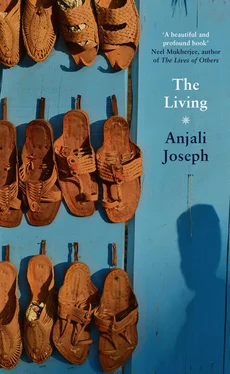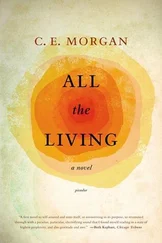1 ...7 8 9 11 12 13 ...30 From the cooking I smelled methi, besan, oil.
I thought about the two brothers, so different. My second son is like a version of me projected into the future. He’s industrious, always wanting to get ahead, without knowing where. He has his mother’s softness, her intelligence and optimism.
There’s something about us that neither of them has. But not every bit of material can be used.
*
Come on, she said.
Just a minute, I said. I checked in the bag.
What now?
Did you bring the … But I couldn’t come up with a word. Towels? I said.
Her eyes, lighter than mine, golden nearly, were intelligent, not quite pitying. I pulled up the zip. All right, I said. Wait — I paused. Did I need to go? No, I said. It’s all right. Actually, wait. I’ll be a minute.
In the bus she gazed out of the window, as though the road was telling a story. I looked across: a stall selling neera, another bus stop, people waiting in their dhotis and a man in a cap, kids in a four-wheel drive, those new hotels that have sprung up in the last ten years, all glass and signs. Everything depressed me.
What’s happened to us? I felt like asking Deepak when they met us at the bus stand.
Sujata is at home, he said, finishing lunch. The boys beamed. I thought of embracing my son, and didn’t. I’d shrunk. Or was he taller? He wore a short-sleeve shirt, that material with holes in it. His moustache was neatly trimmed. His mother hugged him. She never looks out of place.
You can rest while you’re here, Deepak said as he opened the door of the flat. Relax, take it easy.
The house was as I remembered, white floor tiles, fans in every room. Sohan, the littler one, gave me his hand.
Do you always use the fan? I asked.
He nodded, but looked as though he wasn’t sure how to answer.
What if it’s cold? I said.
Then we use a sheet or a blanket, Rohan said.
There were extra mattresses, rolled up, for them to sleep on because we were there.
Baba’s put the geyser on, Rohan told me, in case you want a bath.
I said nothing. Geysers make me uneasy. I shambled into the bathroom and saw myself in the mirror, an intruder with white ear hair.
In the kitchen, we sat around the table, which was covered with a shiny cloth, patterned with bright fruit: bananas, apples, tomatoes, purple plums. There were vade and tea.
You don’t need to cook while you’re here, Sujata told my wife. The bai comes in the morning.
My wife nodded. Then she said, Unless I make something for the boys when they come home?
Sabudana vada! said Sohan.
My daughter-in-law smiled tightly. They don’t need to eat something big, she said. They normally have milk and biscuit.
Sohan squirmed on to my lap. I put an arm around him. My son looked at me, then more closely at his mother. She was flexing her knuckles, pushing at those of the left hand. Certain joints give her pain until they warm up.
In the main room I read the newspaper. I like to see the children, and my son amid his life, which seems to fit him better than the one he had growing up. Then he was patient, watchful. Maybe that was my drinking. In the paper I read of a child being raped, in Kolhapur. I folded the paper and put it somewhere else.
It isn’t that I love to be at home. But being there is no effort; I can go anywhere. Often that journey is to my childhood. The things around me are less real, but the past is immediate. When I was young I saw the future as a road. The road is still there. But this will be the last journey, one without return.
Yet the past is incomplete. My mother, for instance, isn’t an image but a collection of sensations. Her hard, worn palm against my shoulder. The smell of her neck as she bent over me, smoky like a wood fire, but slightly sweet, like a water flower. When she was angry her voice rang out like a clay pot that’s struck — that note of metal. Her speech sounded like an ongoing complaint, a river without variation. My father’s sister was more theatrical. She laughed loudly, sat with her legs loosely crossed, and chewed supari. Even the things she did for herself, like sneezing or breathing, were amplified. In her presence I was delighted, reduced to nothing.
My father was a big man, with a big voice. He didn’t speak much, unlike my aunt, but around her he became more talkative, more smiling. I dreamed of him the other day. He was holding one chappal. He looked confused when he saw me.
Where are you off to? I said.
I’m going home, he said. But — where’s your brother?
I felt the usual pang.
Is he all right? he asked. His face was full of anxiety. Better you don’t tell anyone you saw me, he said, and hurried away.
When I was drinking the world became a crazy circus, entertaining and hilarious, or annoying and to be battled.
If I could just be alone. I’d think about it while I was working, hands busy, but mind elsewhere. When I was eating, or standing outside, watching the boys run around, I thought of the future. They would be older, there’d be more money, and I’d be free, to do something I still hadn’t identified.
One afternoon I went to the workshop to drop off some finished pairs. It was the same as usual in there, the radio on. Around the corner I saw the cracked feet of old Kadam, who always took a nap after lunch.
Pawar! said a short fellow near the door.
And, I said. What’s happening? Borkar is a little younger than I but he was already bald. He looks foolish, which offsets the sly cast to his eyes; he resembles a slightly cunning baby.
We never see you, he said.
I’m there to be seen, I said, but suddenly I wasn’t so sure.
Come out some evening, he said.
Out? I said.
Satpute sat a couple of places from Borkar. He had hair then, sparse but crow-black, a wizened face. He was thin, except for a slackness at the stomach, a weak but enduring sort of man. He put down his needle and made a tipping gesture towards his mouth.
Oh, I said. The truth is, I was at a loose end. I hadn’t thought of myself as having spare time, before my affair with Ratna. My world had been hermetic: family and work. But I’d made time for those excursions, and now the seal was broken. I felt a little expectant all the time, a little disappointed. Maybe, I said. When?
Tonight, Satpute said.
Tonight, Borkar agreed. At sunset. We’ll meet here.
There is a sort of chowk, outside the workshop, before the area where most of these people live. Our house is off the main road, a little separate.
Sunset? I said. We normally ate soon afterwards.
They nodded.
In the evening I told my wife I’d be going out.
Now? she said.
I have work, I said. You all go ahead and eat. I’ll eat later. I left. I was annoyed with her for making me feel awkward. Had I no freedom? I shrugged it off and got to the workshop. There was no one here, but a pale pi dog outside. I loitered next to the dog. Pages of an old calendar blew about. It was dusk; summer, and still very warm.
After a time, feeling let down, I squatted near the dog. I was hungry. I’d go back soon. I imagined our room, as though looking in, saw under the electric light my sons sitting down, my wife giving them rice and daal, and maybe some mutton. What was I doing here? I’d had my excitement. I couldn’t expect life to go on in that way, waiting for a new surprise all the time, like a child.
The dog sighed, and began licking his balls. I got up.
Borkar and Satpute sidled down the road. Where have you been? I wanted to ask, but I’d lost confidence.
Come, Satpute said. We’ll go to the bottle shop. You have money?
Obviously, I said. I felt the notes in my pocket.
Twenty minutes later, we were near the old godown. There were no lights here under the tree, near the tiny Datta temple. The air smelled like fields. I heard crickets.
Читать дальше
Конец ознакомительного отрывка
Купить книгу











